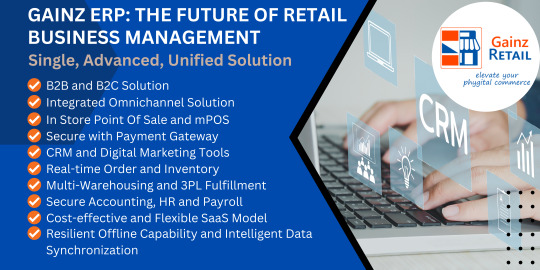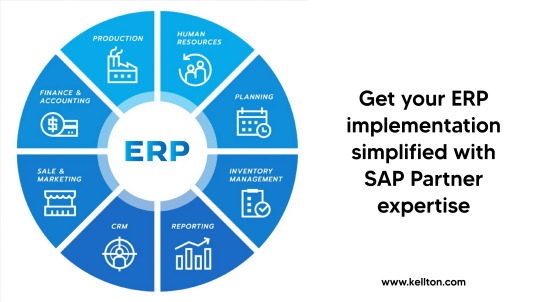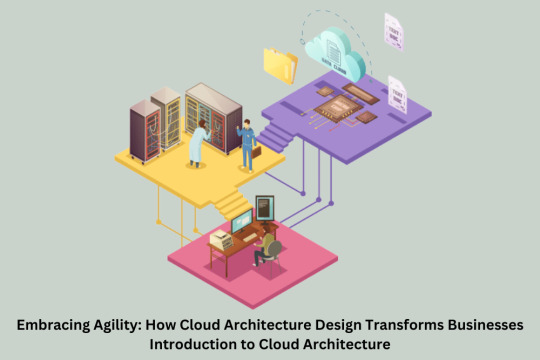#Cloud technology implementation
Explore tagged Tumblr posts
Text
What is ERP and Why Your Small Business Needs It?
Running a small business is a challenging but rewarding endeavor. You wear many hats, juggle countless tasks, and constantly strive for growth. But as your business expands, managing everything with spreadsheets and disconnected software can become a major bottleneck. That's where Enterprise Resource Planning (ERP) systems come in.
What Exactly is an ERP?
Think of an ERP system as the central nervous system of your business. It's a type of software that integrates all your core business processes into a single, unified platform. This means your sales, inventory, accounting, human resources, and other departments can all access and share the same data in real-time.... Read More
#coquicloud#business#businesstips#entrepreneurs#odoo#technologies#techtips#software#saas#small business#business management#business consulting#efficiency#innovation#digitaltransformation#technologynews#productivitytips#cloud solutions#Coqui Cloud#Latino Businesses#Odoo Implementation#technews#Odoo Support#business automation#CRM#Accounting#Inventory Management
2 notes
·
View notes
Text

Hit the bullseye with the right ERP software! 🎯
Magtec Business Solutions helps you choose the perfect ERP solution to take your business to new heights.
Contact us today for a demo!
#erp#magtec#magtecsolutions#business#solutions#uae#software#technology#growth#success#innovation#digitaltransformation#cloud#enterprise#resources#planning#implementation#consulting#support#customization#integration#automation#efficiency#productivity#cost#savings
2 notes
·
View notes
Text

Gainz Retail ERP : The Future of Retail Business Management
We designed Gainz Retail ERP as an easy- to-use, retail business solution for in-store and online shopping.
Gainz Retail eliminates the hassle of maintaining multiple software for: POS - E-commerce - Accounting - Timesheet & Payroll
Let's show you how Gainz Retail ERP can manage your business with a single, advanced, unified solution.
for more details visit - https://www.odata.com/
#cloud erp#erp for small business#erp implementation#erp software#erpdevelopment#erpcompany#erp#erpsolutions#canada#sap erp#saas technology#saas application development#saascompany#saas software#saas app development company#retail pos software#retail store#retail business#retail erp software
2 notes
·
View notes
Link
Explore the technologies enhancing Financial Services and BFSI sector including the Financial Services cloud. Features including account administration, financial planning tools, portfolio management, and compliance monitoring are available in the Salesforce Financial Services Cloud. To offer a complete solution for financial institutions, it also interfaces with other Salesforce products like Marketing Cloud and Sales Cloud.
#salesforce wealth management#Financial Services Cloud#Financial Services Cloud Trends#Salesforce Financial Services Cloud#Future Technolgy#Financial Services#Technolgy Trends#Artificial intelligence#Low-Code#No-Code#Low-Code Solutions#No-Code Solutions#Financial institutions#NBFCs#Assets management#Cloud implementation#Cloud-based infrastructure#Technology Adaptation#AWS financial services#Financial cloud salesforce#Cloud financial services#Salesforce for financial advisors#Financial cloud computing#Cloud based financial services#Salesforce finance#Salesforce FSC
2 notes
·
View notes
Text

Accelon Technologies is your trusted SAP Business One Partner in Delhi, helping businesses simplify operations, enhance efficiency, and drive growth. Our expert team specializes in SAP Business One implementation, customization, and support to ensure seamless integration with your business processes. Whether you need ERP consulting, data migration, or industry-specific solutions, we tailor SAP Business One to meet your unique needs. With real-time insights, automation, and streamlined workflows, we empower businesses to make informed decisions and stay competitive.
#SAP Business One#SAP Business One Partner#SAP Business One Delhi#ERP Software#Business Automation#SAP Partner Delhi#Accelon Technologies#ERP Consulting#Business Growth#Enterprise Solutions#SAP Implementation#Cloud ERP#Small Business ERP#SAP Customization#Digital Transformation
1 note
·
View note
Text
#technology#Enterprise Resource Planning (ERP)#ERP Solutions#Business Management Software#Integrated Business Applications#Supply Chain Management#Customer Relationship Management (CRM)#Financial Management Systems#Human Resources Management#Inventory Management Software#Manufacturing Resource Planning#Cloud ERP Solutions#On-Premise ERP Systems#ERP Implementation Services#ERP Consulting#ERP Software for Small Business#ERP Software for Manufacturing#ERP System Integration#ERP Software Development#ERP Customization Services#ERP Training and Support#technews#techcore
0 notes
Text
Top 15 ERP Systems for Small Businesses in 2024

In today’s business environment, small businesses require robust ERP systems to manage operations efficiently. An ERP (Enterprise Resource Planning) system streamlines key business functions like finance, inventory, HR, and supply chain management, helping businesses make data-driven decisions. While traditionally seen as solutions for large enterprises, many ERP systems now cater specifically to small businesses, offering scalability, flexibility, and cost-effectiveness.
Here’s a list of the top 15 ERP systems for small businesses in 2024:
1. SAP Business One
A leading choice for small and midsize businesses, SAP Business One is known for its comprehensive features covering financial management, inventory, sales, and customer relationships. Its scalable nature allows businesses to grow without outgrowing their ERP solution.
2. Oracle NetSuite
Oracle NetSuite remains a popular cloud-based ERP solution, offering a unified business management suite that includes ERP, CRM, and e-commerce features. Its customizable and scalable platform is ideal for growing businesses.
3. Microsoft Dynamics 365 Business Central
Designed for small to medium businesses, Dynamics 365 Business Central provides end-to-end management of finances, sales, service, and operations. Its integration with other Microsoft tools like Office 365 and Power BI adds significant value.
4. Odoo
Odoo offers a unique blend of affordability and flexibility with its open-source ERP platform. It provides a wide range of modules, including CRM, inventory management, accounting, and more, making it a top choice for businesses on a budget.
5. Zoho ERP
Zoho is known for its extensive suite of business tools, and its ERP platform is no different. Zoho ERP covers everything from project management to financial reporting, making it a versatile option for small businesses.
6. Acumatica
Acumatica is a cloud-based ERP solution with a focus on ease of use and flexibility. It offers industry-specific editions, making it suitable for small businesses across different sectors.
7. Sage Intacct
Sage Intacct stands out for its robust financial management capabilities. It’s a preferred solution for businesses seeking a cloud-based ERP with strong accounting and budgeting features.
8. Infor CloudSuite
Infor CloudSuite provides small businesses with industry-specific ERP solutions. Known for its intuitive design and real-time data insights, Infor is perfect for businesses in manufacturing, distribution, and services.
9. Epicor
Epicor ERP is tailored to small and mid-sized businesses, particularly those in manufacturing, distribution, and retail. Its modular approach allows businesses to pick and choose the features that suit their needs.
10. Tally ERP 9
Tally is a household name among small businesses, especially in India. It’s known for its simplicity and powerful accounting features, making it a go-to solution for financial management.
11. QuickBooks Enterprise
QuickBooks is already popular for accounting, and its Enterprise version extends these capabilities to provide an all-in-one ERP solution. It’s particularly suitable for small businesses that prioritize financial management.
12. Brightpearl
Brightpearl is an excellent choice for retail and e-commerce businesses. It integrates ERP, order management, inventory, and accounting into one platform, helping businesses streamline their operations.
13. SYSPRO
SYSPRO offers an ERP solution with a focus on manufacturing and distribution. Its small-business edition is packed with industry-specific features and offers deep customization.
14. ERPNext
ERPNext is an open-source ERP solution offering a wide range of features for manufacturing, retail, services, and more. It’s highly customizable and provides a cost-effective solution for businesses looking for flexibility.
15. Priority ERP
Priority ERP offers cloud-based and on-premise solutions tailored for small businesses. With its user-friendly interface and modular design, it provides scalability and control at an affordable cost.
Choosing the right ERP system for your small business depends on your industry, specific needs, and budget. The options listed above provide a broad range of features and pricing models that can accommodate businesses of varying sizes and requirements. By investing in the right ERP, small businesses can unlock greater efficiency, improve decision-making, and scale operations seamlessly.
Partnering with Business Central ERP experts like Intelegain Technologies can help you discover the perfect ERP solution tailored to your small business needs. Get in touch with us to begin your journey toward streamlined operations and enhanced growth.
#erp software#dynamics 365#software development#technology#cloud services#microsoft#erp services#erp solution#erp systems#erp implementation#business central erp support services#d365 business central
0 notes
Text
Optimizing Email Marketing Campaigns with Salesforce Marketing Cloud
Email marketing remains a cornerstone of digital marketing strategies, allowing businesses to reach and engage with their audience directly. Salesforce Marketing Cloud offers robust tools and capabilities that empower marketers to optimize email campaigns for maximum impact and effectiveness. This article explores how organizations can leverage Salesforce Marketing Cloud to enhance their email marketing efforts through strategic implementation and effective use of data-driven insights.
The Importance of Email Marketing in the Digital Landscape
Email marketing continues to be a vital channel for driving customer engagement and conversions. It offers a direct line of communication with prospects and customers, enabling personalized interactions and targeted messaging. Salesforce Marketing Cloud enhances these capabilities by providing tools for segmenting audiences, automating workflows, and measuring campaign performance, thereby maximizing the return on investment (ROI) of email marketing initiatives.
Implementing Salesforce Marketing Cloud for Email Marketing Success
Successful implementation of Salesforce Marketing Cloud begins with a strategic approach to leveraging its features for email marketing. By integrating customer data from various sources, including CRM systems and web interactions, businesses can create detailed customer profiles. These profiles enable personalized email content and precise audience segmentation based on demographics, behaviors, and preferences.
Key Strategies for Optimizing Email Campaigns
Personalization at Scale: Salesforce Marketing Cloud enables marketers to deliver highly personalized email content based on individual customer preferences and behaviors. By utilizing dynamic content blocks and personalized subject lines, businesses can increase engagement and conversion rates significantly. Personalization fosters a sense of connection with recipients, driving higher open and click-through rates.
Segmentation and Targeting: Effective email marketing relies on targeted segmentation. Salesforce Marketing Cloud allows marketers to create audience segments based on criteria such as purchase history, engagement levels, and demographic data. By sending relevant content to specific segments, businesses can improve relevance and deliver messages that resonate with recipients' interests and needs.
Automation and Workflow Optimization: Automation is a key feature of Salesforce Marketing Cloud that streamlines email campaign management. Marketers can automate email sends based on predefined triggers, such as subscriber actions or time-based schedules. Automated workflows ensure timely delivery of messages, follow-ups, and personalized responses, enhancing efficiency while maintaining relevance.
Measuring Success and Iterative Improvement
Data-driven insights within Salesforce Marketing Cloud enable marketers to measure the success of email campaigns comprehensively. Key metrics such as open rates, click-through rates, conversion rates, and unsubscribe rates provide valuable feedback on campaign performance. By analyzing these metrics, businesses can identify trends, optimize content and timing, and refine targeting strategies to achieve better results in subsequent campaigns.
Leveraging Salesforce Implementation Partners for Expert Guidance
Partnering with Salesforce implementation partners enhances the effectiveness of email marketing initiatives within Salesforce Marketing Cloud. These experts offer deep knowledge of the platform's capabilities and best practices for maximizing its use. From initial setup and configuration to ongoing optimization and training, implementation partners provide valuable support that helps businesses achieve their email marketing goals efficiently and effectively.
Case Study: Driving Results with Optimized Email Campaigns
Consider a scenario where a B2B technology company implemented Salesforce Marketing Cloud to revamp its email marketing strategy. By leveraging customer data and segmentation capabilities, the company personalized email content based on industry-specific interests and pain points. They implemented automated workflows to nurture leads through the sales funnel, resulting in a 35% increase in lead conversion rates and a 25% reduction in unsubscribe rates.
Future Trends in Email Marketing
Looking ahead, email marketing will continue to evolve with advancements in technology and shifting consumer behaviors. Emerging trends include the integration of AI for predictive analytics and personalization, as well as the adoption of interactive email content and enhanced deliverability strategies. These innovations will enable marketers to deliver more engaging and relevant email experiences that drive higher engagement and ROI.
Conclusion
In conclusion, Salesforce Marketing Cloud empowers businesses to optimize email marketing campaigns through personalized content, targeted segmentation, automation, and data-driven insights. By leveraging its comprehensive capabilities and partnering with Salesforce implementation experts, organizations can enhance customer engagement, improve campaign performance, and achieve measurable ROI in their email marketing efforts.
#salesforce#technology#business#crm#salesforce implementation services#salesforce implementation partners#salesforce marketing cloud
0 notes
Text
AI-Powered Software Solutions: Revolutionizing the Tech World
Introduction
Artificial intelligence has found relevance in nearly all sectors, including technology. AI-based software solutions are revolutionizing innovation, efficiency, and growth like never before in multiple industries. In this paper, we will walk through how AI will change the face of technology, its applications, benefits, challenges, and future trends. Read to continue..
#trends#technology#business tech#nvidia drive#science#tech trends#adobe cloud#tech news#science updates#analysis#Software Solutions#TagsAI and employment#AI applications in healthcare#AI for SMEs#AI implementation challenges#AI in cloud computing#AI in cybersecurity#AI in education#AI in everyday life#AI in finance#AI in manufacturing#AI in retail#AI in technology#AI-powered software solutions#artificial intelligence software#benefits of AI software#developing AI solutions#ethics in AI#future trends in AI#revolutionizing tech world
0 notes
Text

Unlock peak efficiency with our top-rated SAP service provider. Elevate your ERP solutions with expert guidance and cutting-edge technology. Let's optimize your business together.
#SAP service provider#enterprise solutions#business software#technology consulting#ERP implementation#SAP integration#industry-specific solutions#managed services#cloud migration#digital transformation
0 notes
Text
0 notes
Text
SAP isn't just about software; it's about empowering you with knowledge. With SAP ABAP development technology consultant services, you get customised reports that act like a crystal ball for your business. These reports provide a deep dive into your company's health, from financial performance to operational efficiency. By identifying trends and spotting potential issues early on, you can make informed decisions that drive growth and innovation.
#SAP ABAP development technology consultant services#RISE with SAP Cloud#SAP SuccessFactors Employee Central#SAP best practices for S4 Hana implementation services
0 notes
Text
Leading ERP Company in Chennai Offering Innovative Software Solutions

Experience business transformation with BatchMaster, the preferred ERP software company in Chennai. Our innovative solutions are crafted to meet the evolving needs of Chennai's diverse industries, providing a robust platform for growth and competitiveness.
0 notes
Text
Embracing Agility: How Cloud Architecture Design Transforms Businesses
Introduction to Cloud Architecture In the contemporary landscape of technology, businesses are increasingly reliant on cloud services to propel their operations forward. Cloud architecture design has emerged as a pivotal element in this domain, offering scalable, flexible, and secure infrastructures that cater to diverse business needs. Crafting an efficient cloud architecture involves strategic…

View On WordPress
#Adaptive Cloud Solutions#Agile Cloud Solutions#Agility in Business#Business Transformation#Cloud Architecture Design#Cloud Infrastructure Evolution#Cloud Technology Impact#Digital Transformation Strategies#Embracing Agility#Future of Cloud Architecture#Innovations in Cloud Design#Strategic Cloud Implementation#Transformative Business Practices
0 notes
Link
Fast Healthcare Interoperability Resources, or FHIR, are a crucial component of contemporary healthcare. It is a protocol for electronically transmitting medical data. It is intended to make it simpler for patients to access their health information as well as for healthcare providers to transfer data among systems. Modern web technologies are the foundation of FHIR, which was designed to be adaptable, modular, and extendable. As a result, it is an effective tool for handling healthcare data. Electronic health records (EHRs) are becoming more prevalent, and there is a growing need for efficient and secure data sharing. In reality, it's crucial to comprehending how to begin using FHIR. We will discuss the fundamentals of FHIR in this FHIR implementation guide. Provide step-by-step instructions for using this cutting-edge technology as well.
#smile cdr#FHIR#FHIR Implementation#Implement FHIR#FHIR Implementation Guide#Fast Healthcare Interoperability Resources#healthcare information exchange#Healthcare IT#Healthcare Technology#Healthcare Interoperability#HAPI FHIR#Firely FHIR#Microsoft Azure API for FHIR#Google Cloud Healthcare API#AWS HealthLake#non-technical to implement FHIR#FHIR applications#Healthcare Integration#Healthcare IT Integration#FHIR client#exchange patient data#electronic health record#EHR system#cloud platform#healthcare ecosystem#FHIR server#FHIR for healthcare
2 notes
·
View notes
Text
In today’s fast-paced digital landscape, businesses are constantly seeking innovative ways to adapt, grow, and stay competitive. One of the most transformative technologies that have reshaped the business world is the adoption of public cloud offerings such as AWS (Amazon Web Services) and Azure (Microsoft’s cloud platform). At PDcloudEX, we are committed to guiding you through the fundamental concepts of public cloud technology, its benefits, and its implications for your business. Join us on this journey to understand the world of unparalleled cloud-based solutions.
#Cloud Technology#AWS (Amazon Web Services)#Azure (Microsoft Cloud)#Public Cloud#Digital Transformation#Business Innovation#Competitive Advantage#Cloud Adoption#Cloud Benefits#PDcloudEX#Cloud Solutions#Cloud Services#Technology Trends#Business Growth#Cloud Computing#IT Infrastructure#Cloud Strategy#Cloud Implementation#Cloud Migration#Cloud Consulting
1 note
·
View note